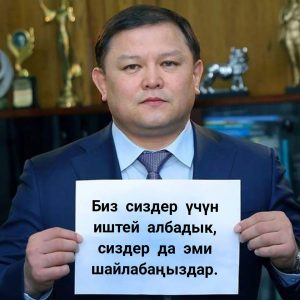Less than two weeks ago, a Women’s Day rally in Bishkek ended before it even began. Just minutes before the march was scheduled to start, a group of masked men descended on the peaceful gathering, throwing eggs and rocks, smashing posters, and screaming hate. International media and human rights organizations decried the violence and the pathetic state response, but the episode – and the deeper problems revealed by the use of “traditional values” to justify repression – was swept aside as the coronavirus pandemic took over Kyrgyzstan’s media landscape.
For weeks as the number of COVID-19 cases climbed worldwide, Central Asia remained a blank spot on the map of the virus’s spread, perhaps due to insufficient testing, the region’s relative isolation, or preventative measures taken. Even before the first COVID-19 cases in Central Asia were confirmed – on March 13 in Kazakhstan, March 15 in Uzbekistan, and March 18 in Kyrgyzstan – social media posts peddled fear and rumors about the virus and how to prevent it.
In an effort to raise awareness about COVID-19, on March 19 Kyrgyzstan’s parliament organized a “flashmob” that involved deputies holding up signs with an encouraging hashtag: “We’ll win with harmony.” The flashmob was a visual echo of doctors and nurses worldwide who’ve posted photos of themselves holding signs asking people to respect calls to self-quarantine.
Kyrgyz parliamentarians’ efforts to raise awareness may have been well-intentioned, but meme-makers saw a golden opportunity in photos of prominent politicians holding up white pieces of paper. Just hours after the flashmob, the first photoshopped versions appeared.
Dastan Jumabekov, speaker of the Jogorku Kenesh, Kyrgyzstan’s unicameral parliament, was hit especially hard by the memes. In one Facebook post that has been shared over a thousand times, the text on Jumabekov’s sign has been replaced with the message, “We couldn’t work for you, so you shouldn’t vote for us.” Another version has Jumabekov holding a sign offering a spot in a taxi from Bishkek to “Mayanye,” poking fun at the speaker for repeatedly botching the pronunciation of a German town while debating the ratification of an agreement with the European Investment Bank.
One of the cleverer photoshopped versions closed the circle between the March 8 protests and COVID-19; the doctored image shows Jumabekov and other male parliamentarians holding up signs saying “I won’t get married!” and “I won’t pour tea!” This meme is a direct nod to digital manipulations of photos from the March 8 rally that replaced messaging on signs decrying Kyrgyzstan’s serious problem with violence against women with refusals to pour tea, get married, or give birth. Even though the photoshop job was poorly executed, social media users still got bogged down in a debate about traditional values.
Not unlike the scandal that followed censorship of a feminist art exhibit in Bishkek last November, this debate about the necessity of a “traditional mentality” distracts from the original repression of constitutionally-enshrined free speech. This in turn lets those who tried to silence the Women’s Day march – including the judges who approved restrictions on the freedom of assembly, the masked men who violently attacked the peaceful gathering, and the police officers who arrested the attendees instead of the attackers – off the hook.
Now that COVID-19 has officially reached Central Asia, it’ll be hard to focus on much besides the looming public health crisis and economic devastation. But it’s important not to let authorities hide violent, repressive behavior under the news-storm the virus has brought. Fortunately, these memes are more than just jokes and demonstrate that Kyrgyzstani citizens will hold their elected officials accountable, if not in the form of mass rallies, then via novel digital channels.

































